新概念英语第二册1课实用课件
新概念英语2 Lesson1课件(共60张PPT)

Seatbelt = safety belt
• Fasten your seatbelt, please!
单词表示抽象概念:
席位
• Win a seat in the congress 赢得一个议会席位 • Lose a seat in the congress 丢掉一个议会席位
☆attention n.注意
Last week, I went to the theatre. • 去看戏
• 注意拼写规则: • theatre (Br)= theater (US) • centre = center • metre = meter
Last week I went to the theatre. 译: 上星期我去看戏。 go to the +地点 表示去某地做什么 go to the theatre = go to the theatre to see a play去剧场看戏 go to the cinema =see a film去电影院看电影
I had a very good seat. The play was very interesting. I did not enjoy it. 我的座位很好戏很有意思无法欣赏。
interesting adj .引起兴趣的,有趣的 eg: This man is very interesting. The book is so interesting that I do not want to put it down. interested adj. .对…感兴趣的 be interested in sth/ doing sth eg. I am interested in sports. Professor Qiao is very interested in collecting stamps. enjoy v.享受…之乐,欣赏,喜爱 enjoy doing sth enjoy swimming 喜欢游泳。 How did you enjoy your trip 旅行如何? enjoy one's dinner 饭吃得津津有味。
新概念英语第二册 Lesson 1课件
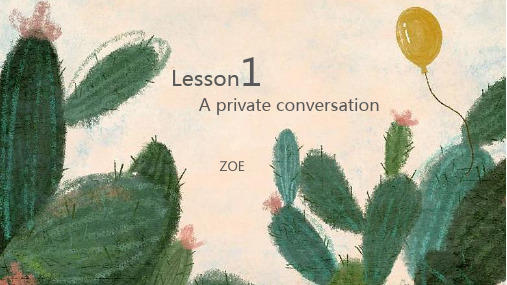
6.attention [ə'tenʃ(ə)n] n.
注意力
把注意力放在…上面 pay attention to 请注意听课。
Please pay attention to listening to the teacher.
稍加注意 多加注意 更加注意
pay a little attention to pay much attention to pay more attention to
The girl is sleeping_p__e_a_c_e__fu__ll_y_ (peaceful, peacefully)
Text Understanding
2
Listen and answer the questions:
1.Where did the writer go last week? 2. Why didn’t he enjoy the play? 3.What did the young man say to the writer?
not interesting,’ or did he say, ‘This is a private conversation!’?
Now, work in pairs and ask your partner these questions. Then put your answers together into a paragraph to retell the story.
Thanks!
rude adj.粗鲁的
--
rudely adv.无礼地,粗鲁地
形容词变副词的规则:
1.一般情况下直接加 “ly”
如:quick---quickly, loud--loudly, slow-slowly, careful-carefully 等
新概念英语第二册第1课PPT(共34张PPT)

Last week I went to the theatre. I had a very good seat. The play was very interesting. I did not enjoy it. A young man and a young woman were sitting behind me. They were talking loudly. I got very angry. I could not hear theactors. I turned round. I looked at the man and the woman angrily. They did not pay any attention. In the end, I could not bear it. I turned round again. 'I can't hear a word!' I said angrily. ‘It’s none of your business,' the young man said rudely. 'This is a private conversation!'.
总结
一般过去时
1.定义:表示过去某个时间发生的动作 或存在 的状态。 2.结构:主语+动词过去式+其它。 3.时标:last短语,......ago, yesterday......just now. 4.动词变过去式变化规则:直,去,双,改
went hadI_____ a Last week I ______ to the theatre. wasplay_____ very very good seat. The enjoy interesting. I did not _____ it. A young man and a young woman were sitting behind got me. hear I _____ very turned They were talking loudly. angry. I looked could not _____ the actors. I _____ round. I _____ at thepay man and the woman angrily. bear turned any attention. In the end, I They did not_____ said could not _____ it. I _____ round again. 'I can't hear a word!' I _____angrily. said 'It's none of your business,' the you a private conversation!'
新概念英语第二册Lesson1课件
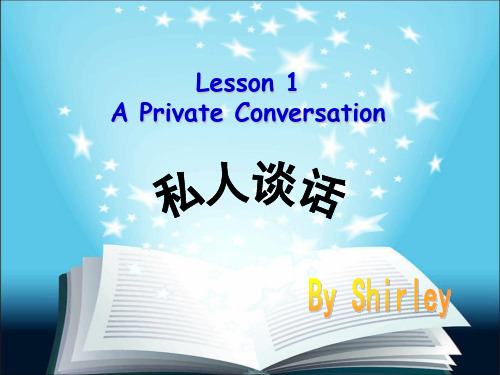
I could not hear the actors.
Key structures and usage
过去进行时:过去某个时间正在进行 或发生的动作 A young and a young woman were sitting behind me.
They were talking loudly.
• • • • • • • • • • • • • • •
【Key structures】 简单陈述句的语序 陈述句一定是有主语,有动词,有宾语,有句号 6 1 2 3 4 5 6 when? Who? Action Who? How? Where? When? Which? Which? What? What? 1 ---主语,一般由名词、代词或名词短语构成,通常位于动词之前,动词必 须与主语一致,即主语决定动词的单复数形式 2 ---谓语,由动词充当 3 ---宾语,一般为名词、代词或名词短语 4 ---副词或介词短语,对方式或状态提问,往往做状语 I like her very much 5 ---地点状语,一般在方式副词之后,时间副词之前 6 ---时间状语,可以放在句首或句末 简单陈述句一定不能少的是主语, 谓语. 如果问何时何地,是一个固定搭配 when and where
• • • • • •
★business n. 事, 生意 ① n. 生意 business man :生意人 do business: 做生意 ② n. 某人自己的私人的事情 It's my business. (指私人的事, 自己处理的 事) • It's none of your business. 不关你的事。
Language points
以下短语中名词前不加冠词:
新概念英语第二册Lesson1完整课件
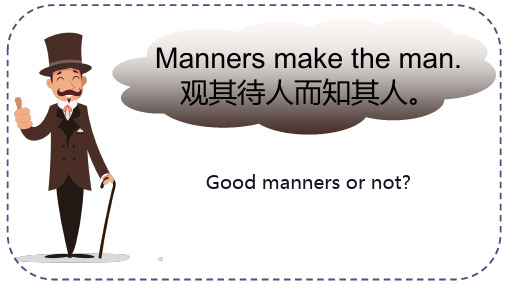
[v.]
seat
seat sb.
[n.]
让某人就坐
have a very good seat
= a very good place
视线无遮挡,所处的位置非常
好,而非椅子本身材料好。
take one's seat
business
1. 事情(私人的) It's none of my business.
adj. 私人的
private school 私立学校
private letter 私人信件
privacy/ˈprɪvəsi/ n.隐私
public adj. 公众的,公开的 public school 公立学校 public place 公众场所
angry
angry adj. 生气的 be angry with sb. 生某人的气 be angry at/about sth. 为某事而生气
interested adj. 对…感兴趣的 be interested in sth/ doing sth. I am interested in sports.
enjoy v.享受…之乐,欣赏,喜爱 enjoy doing sth. enjoy swimming 喜欢游泳 enjoy one's dinner 饭吃得津津有味 enjoy oneself 玩得开心 =have fun=have a good time
late----late far----far
Listening
Why did the writer complain to the people behind him?
Last week I went to the_t_h__e_a_t_r_e_. I had a very good__s_e_a_t_. The play was very interesting. I did not_e_n__j_o_y it. A young man and a young woman were sitting behind me. They were talking_l_o_u__d_l_y_. I got very__a_n_g__r_y_. I could not hear the actors. I turned round. I looked at the man and the woman_a__n_g__ri_l_y_. They did not pay any_a_t_t_e_n__ti_o__n. In the end, I could not bear it. I turned round again. ‘I can't hear a word!’ I said angrily.
新概念英语第二册Lesson1课件_PPT

theatre n. 剧院
美音把t发成[d],并加儿化音,结尾re写成er.
seat n. 座位(这个词很重要,考试常考)
have a good seat,这里的seat指place(指地方不错),而不是chair。 take/have a (one’s) seat 请坐 口语电影中常见: Is this seat taken?
5. The play was very interesting , but I didn’t enjoy it. 并列句
6. I couldn’t hear a word. 简单句
7. If you love it, just do it. 复合句 If引导条件状语从句
二、句子的顺序
Birds sing.
privacy n.隐私 (age, salary, marriage, religion) invade one’s privacy 侵犯了某人的隐私
conversation n.谈话
talk n./v. 做名词时,非正式谈话用talk,如let’s have a talk. 而正式会晤talks, 如peace talks 和谈
It’s none of your business.=Mind your own business. one of us/one of the books 其中one是代词 none也是代词,没有人
重点内容回顾: go to the theatre enjoy get very angry turn round pay attention in the end It’s none of your business.
Pay attention to your spelling.稍加注意你的拼写。
新概念英语第二册 Lesson1课件
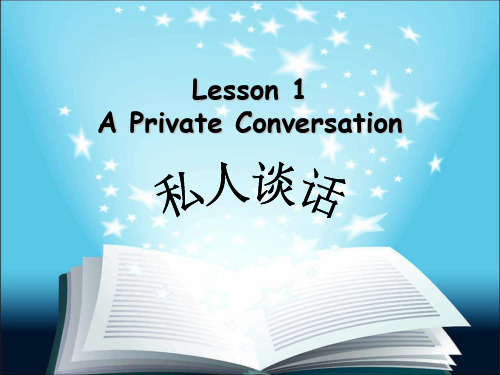
4. 主谓宾宾补
I find him tired. We must keep our room clean. We make them happy. …
5. 主系表
I am a teacher. She is beautiful. We feel tired. …
课文背诵
时态填空
• Last week I _w_e_n_t_to the theatre. I _h_a_d_ a very good seat. The play w__a_s_very interesting. I _d_id__ not enjoy it. A young man and a young woman _w_e_r_e_s_it_ti_n_g_ behind me. They _w_e_r_e_t_a_lk_i_n_g loudly. I _g_o_t__ very angry. I _c_o_u_ld_not hear the actors. I turned round. I l_o_o_k_e_d_a_t_the man and the woman angrily. They _d_i_d_not pay any attention. In the end, I could not bear it. I _tu_r_n_e_d_r_o_u_n_d__ again. ‘I can't hear a word!’ I _s_a_id_angrily. ‘__I_t’s__n_o_n_e_o_f_y_o_u_r_b_u_s_i_n_e_s_s___, ’ the young
6
When?
To the theatre
Behind me
句子结构: 1. 主谓
新概念第二册第1课(共22张PPT)

Eg: go to school 去上学 go to hospital 去医院看病
2. enjoy +sth. 喜欢,从中得到享受;
enjoy the music/ the dinner enjoy doing sth. enjoy oneself :过的开心,愉快
go to the theatre: 去看戏
① go to the +地点:去某地干嘛
Eg:go to the hospital (不是去看病,可以是去看病人)
②go to the +人’ s: 去某人开的店
Eg:go to the doctor’s (去看病) go to the butcher’s (去买肉)
I turned round again. ‘I can't hear a word!’ I said
angrily.
‘It's none of your business, ’ the young man said rudely. ‘This is a private conversation!’
['biznis]
n.事
12 rudely
['ru:dli]
ad.无礼地,粗鲁地
Private
① adj. 私人的; 反义词:public (公共的) public school 公立学校
private school 私立学校 privacy n. 隐私 It’s my privacy.
② adj. 普通的 Private citizen 普通公民 Eg:<saving private Ryan> 电影《拯救大兵瑞恩》
新概念第二册Lesson1课件PPT
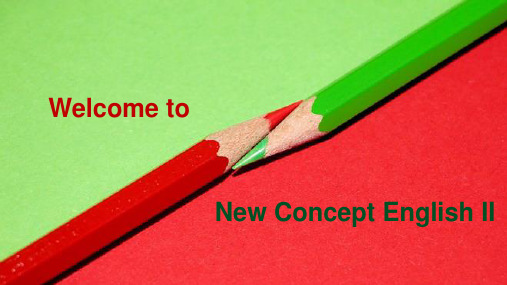
eg. win/lose a seat
2) vt. 安排….坐下; 使…就座
seat yourself. 你请坐。 Be seated, please. 请坐。 Sit down, please. Will you have a seat? Would you have a seat?
pay some attention to sth pay more attention to sth pay close attention to sth pay great attention to sth pay enough attention to sth pay little attention to sth pay no attention to sth.. 毫不在意
★ loud – adj. 大声的
1) adv. loudly adv. aloud
eg. She called loudly for help. = She called aloud for help.
think aloud 自言自语
★ attention – n. 注意
pay attention to sth
New words and expressions
★private - adj.
1) 私人的 (personal ) a private teacher a private car a private school private affairs eg. That is for your private ear. 这是说给你一个人的秘密。
新概念英语第二册-lesson1课件

12 There are a lot of people at the bus stop. 13 The little boy ate greedily an apple in the
kitchen this morning. 14 She draws beautifully. 15 I like music very much. 16 They built a new school in our village last year. 17 The match ended at four o'clock. 18 She received a letter from her brother last week.
3. The play was very interesting.
[参考翻译] 那场戏剧演得非常有意 思。
[语言点] very 为副词,interesting为 形容词,副词修饰形容词一般放在 其前面。
比如: very hot非常热, quiet easy 十分简单,但good enough 为例外。
have a conversation about sth. 例:Shall we have a conversation
about your vacation ?
同义词:
conversation 无拘束或非正式的 谈话
talk
谈话内容可正式或非正式
chat
闲谈、聊天
discussion (小型的)讨论、商议
like意义要深得多。 enjoy music享受音乐, enjoy dinner享受宴会, enjoy life享受生活
② enjoy doing enjoy swimming 喜欢游泳, enjoy fishing喜爱钓鱼 ③ 一般不可说enjoy sb This morning I enjoyed my English
新概念第二册第1课课件(共36张PPT)

Eg:我去天津出差了。 I went to Tianjin on business. 这是我的私事。 It‘s my business. 不关你的事。
那辆汽车绕过房子,一会儿就不见了。 The car turned round the house and disappeared in a while.
含turn的短语: turn down 拒绝、调小(音量) turn up 出现、调大(音量) turn in 交还、上交 turn to 向…救助 turn on 打开(煤气、自来水、点灯等)---turn off关闭
It's none of your business.
2. Text
Listen and answer the question:
1. Where did the writer sit in the theatre? A. Beside a young man and a young woman. B. Behind a young man and a young woman. C. In front of a young man and a young woman.
They had a short conversation in German. 他们正在谈话。 They are having a conversation.
区分: conversation. 比较正式一些 talk 可以正式,也可以私人的
Eg:Let‘s have a talk. 我们谈一谈。
3. theatre n.剧场,戏剧 go to the theatre 去看戏剧 区分: cinema: 电影院=movie theatre go to the cinema= see a film 去看电影
新概念英语第二册第1课ppt课件
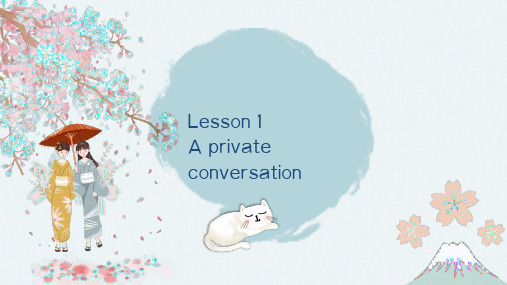
.
n. privacy 隐私.
It's my privacy. It's none of your business!
【反】 public adj. 公共的,公开的 .
New words
conversation n. 对话,谈话
.
have a conversation with sb 和某人有一个谈话 .
New words seat n. 座位 vt. 安排......坐下
. Have/take a/one's seat 请坐
..
请坐的2种说法 : Sit down,please.(命令性) Take your seat,please. (更礼貌)
New words angry adj. ___生__气__的_
Text
‘It's none of your business,' the young man said rudely. 'This is a private conversation!'.
Part 3 Grammar
Grammar
一、主+谓(谓语为不及物动词) The sun rises. He left.
ቤተ መጻሕፍቲ ባይዱ
--
angrily adv.生气地
--
rudely adv.无礼地,粗鲁地
New words
形容词变副词的规则:
1.一般情况下直接加“ly” quick---quickly, loud--loudly, real-really, slow-slowly, careful-carefully 2.以辅音字母加y结尾的变y为i,然后再加-ly happy---happily, easy-easily, busy-busily 3.少数以e结尾的形容词,要去掉e再加-ly true-truly, terrible-terribly,possible-possibly 但绝大多数以e结尾的形容词仍然直接加-ly。例如:rude-rudely, polite-politely, widewidely等。
新概念英语第二册Lesson1课件

bear
1. v. bear-bore-borne 承受,应付 The pain was almost more than he could bear. 这种痛苦几乎使他无法忍受。 I can’t bear having cats in the house. 家里有猫我可受不了。 2. n. 熊 bearable [ˈbeərəbl] adj. 可忍受的,经得住的 The climate is bearable. 这个气候是可以忍受的。 The pain is bearable. 这点疼痛是可以忍受的。 unbearable 无法忍受的
No conversation while I’m talking. 我讲话时不要讲话。
theatre n.
1) 戏院,剧场 你多久看一次戏? How often do you go to the theatre? 2) 戏剧 我喜欢音乐、戏剧和电影。 I like music, theatre and cinema.
I did not enjoy it.
enjoy vt. 欣赏,享受,喜爱 ④do-did- done ① enjoy +n. 喜欢,从当中得到一种享受(后面不能跟人) I enjoy the music. enjoy the dinner/film/program/game ② enjoy oneself(反身代词) 玩得开心 We always enjoy ourselves. ③ enjoy +动名词 (doing sth.) Jane doesn’t enjoy swimming. She enjoys going to the theatre.
3) [U] 营业额,营业状况 Business was bad. 生意不景气。 How’s business? 生意如何? 4) [C] 商业机构,企业,工厂 have /start/run a business 拥有/开办/经营企业 He works in the family business. 他在家族的企业工作。
新概念第二册第1课课件

Lesson 1 A private conversation
1. New words
private conversation theatre seat play loudly angry angrily attention bear business rudely
10."It's none of your business," the young man said rudely. "This is a private conversation!"
none of one’s business 不关…的事、与…无关
eg:我的私生活与你无关。 My private life is none of your business.
postman.
9.I turned round again. "I can't hear a word!" I said angrily.
(a word 等于一句话)
他一句话也没说。
He didn't say a word.
Actions speak louder than words.
事实胜于雄辩。行动胜过语言。
Were talking
A very good seat Very interesting It
Loudly
5
Where? To the theatre
Behind me
6
When?
Grammar: 五大基本句型
1. 主语+谓语 Eg:The sun rises. 2. 主语+谓语+宾语 Eg: I love you. 3. 主语+谓语+双宾语 Eg: I sent you an e-mail. 4. 主语+谓语+宾语+宾语补足语 Eg: English drives me crazy. 5. 主语+系动词+表语 Eg: This song sounds good.
- 1、下载文档前请自行甄别文档内容的完整性,平台不提供额外的编辑、内容补充、找答案等附加服务。
- 2、"仅部分预览"的文档,不可在线预览部分如存在完整性等问题,可反馈申请退款(可完整预览的文档不适用该条件!)。
- 3、如文档侵犯您的权益,请联系客服反馈,我们会尽快为您处理(人工客服工作时间:9:00-18:30)。
湖南农业大学教育实习教案教案内容: Lesson 1 A Private Conversation学 院:教育院 班 级:10英语教育班姓 名:任 黎 学 号:201040927108Lesson 1 A Private Conversation Teaching Aims and demands:1. Review the words and phrases2. analysis of the six elements of simple statement and the word order3. Grasp the following expressions:Conversation, go to (the) +somewhere,pay attention to ,bear,turn round,in the end,enjoy,4. Learn the two idioms :I can not bear it !It’s none of your business.5. Practice oral English with the topic “An amusing experience youhave at shool”.Teaching Content: Text ; Exercises (from Vocabulary to Writing)Teaching Key points and difficult points:1. Understanding the six elements of English story writing2. bear, pay attention, bussiness,Teaching Periods: 6 periodsTeaching Procedures:Period 1:Ⅰ. Renew the wordstheatersea conversation private publicbearplayplayer business turn round turn down annoy angry angrily loudloudlyrude rudely actorPeriod 2-4:Ⅰ. Introduction to the text by talking something in our daily life and doing some listening exercise.Ok, I have a question.One day, when you get on a bus but there are many people crowded, what should you do? Should we jump a queue? No, we should stand in a line and get on the bus one by one, right? Well, in daily life, there are so many such rules we should obey, not only for others but also for ourselves. Ok, today we will learn a story taking place in a theatre. It’s very funny. First boys and girls ,put your books aside then we will have a dictation . Just fill in the blanks and try to understand the main idea of the story.Are you ready? Listen to the audio, Ok, let’s begin.F ill int blanksLast week I to the theatre. I had a very good . The ____was very . I did not it. A young man and a young woman were sitting behind me. They were talking . I very angry. I could not hear the actors. I . I looked at the man and the woman . They did not pay any . In the end, I could not it. I turned round . 'I can't hear a word!' I said angrily.'___________________________________,' the young man said . 'This is a ________________!'.Ⅱ1 .Ask students to listen to the audio again and finish the pre-classwork to get the main idea of the text. Then answer the following questions and analyze the structure of the text.① Where did the writer go last week?The theatre.② Why didn’t he enjoy the play?Because the two people sitting kept talking so loudly that he could not hear the actors③ What did the young man say to the writer?'It's none of your business,' the young man said rudely. 'This is a private conversation!'2. The structure of the text:① Last week I went to the theatre. I had a very good seat. The play was very interesting.I went to the rheater.②I did not enjoy it. A young man and a young woman were sitting behind me. They were talking loudly. I got very angry. I could not hear the actors.I can not enjoy the play.③ I turned round. I looked at the man and the woman angrily. They did not pay any attention.The first time I turned round.④In the end, I could not bear it. I turned round again. 'I can't hear a word!' I said angrily.'It's none of your business,' the young man said rudely. 'This is a private conversation!'The second time I turned round.Ⅲ. Explain the text in details.st week I went to the theatre.The literal meaning of the verb go is leaving one place to another place.go to the +somewherego to the theatre = go to the theatre to see a playgo to the cinema =see a filmgo to the dairygo to the doctor's go to the butcher'sgo to +somewhere:go to school go to church [tʃɝtʃ]go to hospital go to bedgo homee.g. I am at home.2. I had a very good seat.seate.g. the front seat of a car Take a seat, please. /Have a seat./Seat yourself./sit down please.3. This is a private conversationConversationhave a conversation with sb.SunNing had a conversation with the headmaster.(2011.shanxi)4. I did not enjoy it.enjoy vt.① enjoy +n.e.g. I enjoy the music.enjoy the dinner/film/program ['progræm] /game② enjoy oneself/pronoune.g. We always enjoy ourselves.③enjoy +V-inge.g. Jane doesn’t enjoy swimming. She enjoys going to the theatre.5. I could not hear the actors. I turned round.e.g. I could not hear you. Beg your pardon?I couldn't hear you./I couldn't hear a word./I couldn't catch [kætʃ] your words.I couldn't hear you clearly./I couldn't catch your words. Beg your pardon? /I couldn't catch your words.turn round =turn around6. They did not pay any attention.pay attention to +N/V-ing/pron.the center/focus of attentionTranslation:我们应该注意保持安静。
